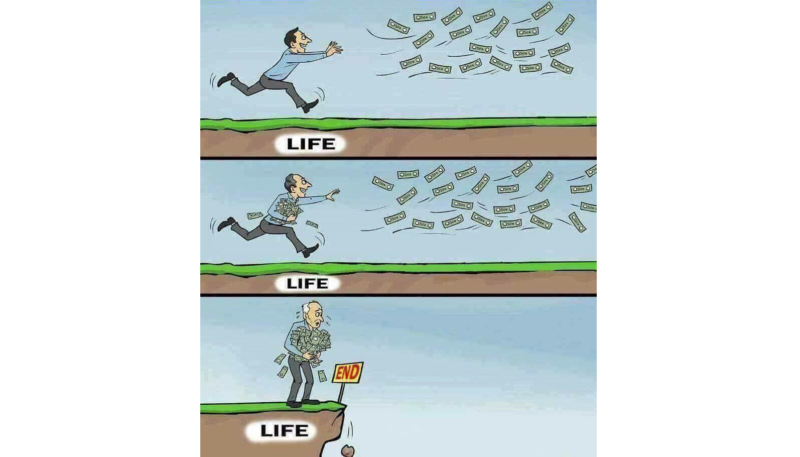What's My Money Got To Do With It?

We discovered from our last article entitled Learning to Shoot Straight that perfect, whole tefillah is acquired through personal purity and tzedakah, i.e. the giving of charity.Therefore, if we want to remove the impediments that inhibit or limit our tefillot, we should learn how to purify ourselves and how to reduce our craving for money. Since we have written about personal purity in the past, we’ll now focus on our desire for money.
Rava testified that the very first question we are asked after departing this world and ascending to the upper worlds for judgment is (Shabbat 31a): נָשָׂאתָ וְנָתַתָּ בָּאֱמוּנָה (Did you conduct your business affairs with emunah). The fact that this is the first question tells us something about how seriously it is viewed in Heaven. But what exactly does it mean to conduct our business affairs with emunah, and why might this be the first question we are asked?
If we are not careful, money can easily become an object of idolatry, i.e. avodah zarah. Describing the time of the final redemption, it is written (Yechezkel 7:19): כַּסְפָּם בַּחוּצוֹת יַשְׁלִיכוּ וּזְהָבָם לְנִדָּה יִהְיֶה (They will throw their kesef [silver, money] in the streets and their gold will be comparable to a niddah). A niddah is an av ha-tumah, a primary source of tumah, i.e. ritual impurity that can transmit tumah to other things including people. Further, R' Akiva taught (Shabbat 82a): מִנַּיִין לַעֲבוֹדָה זָרָה שֶׁמְּטַמְּאָה בְּמַשָּׂא כְּנִדָּה שֶׁנֶּאֱמַר תִּזְרֵם כְּמוֹ דָוָה צֵא תֹּאמַר לוֹ מָה נִדָּה מְטַמְּאָה בְּמַשָּׂא אַף עֲבוֹדָה זָרָה מְטַמְּאָה בְּמַשָּׂא (From where do we know that an idolatrous object [avodah zarah] transmits tumah by being carried [even without direct contact] just like a niddah? It says [Yeshayah 30:22]: “You will cast them away like a niddah. ‘Get out!’ you will say to it.” Just as a niddah makes one tamei by being carried, so too does an avodah zarah make one tamei by being carried). Even the slightest craving for money turns it into an avodah zarah, which, in turn, makes it capable of making us tamei merely by being carried.
But we may ask, What about the Patriarchs? Weren’t they fabulously wealthy? Yes, at times they were, for example (Bereshit 13:2): וְאַבְרָם כָּבֵד מְאֹד בַּמִּקְנֶה בַּכֶּסֶף וּבַזָּהָב (And Avram was very wealthy [kaved me’od] with cattle, silver and gold). Avram became exceptionally wealthy, but notice the language used to describe his riches: kaved me’od. These words literally mean ‘very heavy’, which implies that his material wealth was a burden, literally and figuratively. But at other times they were dirt poor, such as when Yaakov showed up at the house of Lavan after his flight from Esav (see Rashi to Bereshit 29:13). Either way, wealth itself is not our topic here. Rather, we are focusing on our relationship to money itself, the attraction that we tend to have for it.
Most all of us have a craving for money. But where did it come from? It came from the sin of Adam ha-Rishon. We have written elsewhere that the fundamental flaw in Adam’s thinking was rooted in a lack of emunah. Due to his arrogance, he wasn’t sure that Hashem had his best interests in mind or that He would provide for all of his needs. As a result, he was treated middah k’neged middah (Bereshit 3:17): בְּעִצָּבוֹן תֹּאכְלֶנָּה כֹּל יְמֵי חַיֶּיךָ (In hard labor [itzavon] you will eat of it all the days of your life). The word עִצָּבוֹן [itzavon] connotes pain, hard work, toil and labor. Interestingly, it’s related to the word עַצְבוּת [atzvut] meaning sadness or depression. Hashem was telling him: “Since you neither put your faith in Me nor trusted Me to provide for you, you will be cursed with having to trust yourself and providing for yourself, so to speak, but it won’t bring you the satisfaction and happiness for which you yearn. Rather, it will bring you only sadness and depression.” This is what we see in Likutei Moharan 23:1: וְאֵלּוּ בְּנֵי אָדָם הַנּוֹפְלִים בְּתַאֲוַת מָמוֹן וְאֵינָם מַאֲמִינִים שֶׁהַקָּדוֹש־בָּרוּךְ־הוּא יָכוֹל לְפַרְנֵס אֶת הָאָדָם בְּסִבָּה קַלָּה וְרוֹדְפִים אַחַר פַּרְנָסָתָם בִּיגִיעוֹת גְּדוֹלוֹת וְהֵם אוֹכְלֵי לֶחֶם בְּעִצָּבוֹן (And these people who fall into the craving for money who don’t believe that the Holy One, blessed be He, can provide for man through a ‘sibbah kallah’, and chase after their source of livelihood [parnasah] through a great amount of labor, they eat their bread in a state of sadness and depression). What does it mean that G‑d can provide for us through a sibbah kallah? It means that He doesn’t need us to put forth a whole lot of effort. Normally, when we think about the law of ‘cause and effect’ we assume that a large effect must be preceded by an equally large cause. But this isn’t true. Hashem doesn’t need a major cause. He’s quite capable of providing for us even through a minor cause. We read this explicitly in Likutei Halachot (Ribit 3): כִּי תַּאֲוַת מָמוֹן הוּא מֵחֲמַת שֶׁאֵין לוֹ אֱמוּנָה וּבִטָּחוֹן בַּה' יִתְבָּרַךְ שֶׁהוּא יִתְבָּרַךְ יָכוֹל לְהַזְמִין לוֹ פַּרְנָסָתוֹ בְּסִבָּה קַלָּה בְּלִי יְגִיעוֹת (For the craving for money is because a person doesn’t have emunah or trust [bitachon] in Hashem, may He be blessed, that He, may He be blessed, can prepare his parnasah for him through a sibbah kallah without hard labor).
But we shouldn’t be too harsh on ourselves. The pressure we feel to provide for our own livelihood (and for that of our families) is so strong that the Torah intimates that it is a greater than what a woman feels at the moment of childbirth. Regarding Chavah, it is written (Bereshit 3:16): הַרְבָּה אַרְבֶּה עִצְּבוֹנֵךְ וְהֵרֹנֵךְ בְּעֶצֶב תֵּלְדִי בָנִים (I will greatly increase your itzavon and your pregnancy and in etzev you will bear children). The Gemara explains the verse (Eruvin 100b): עִצְּבוֹנֵךְ זֶה צַעַר גִּידּוּל בָּנִים וְהֵרוֹנֵךְ זֶה צַעַר הָעִיבּוּר בְּעֶצֶב תֵּלְדִי בָּנִים כְּמַשְׁמָע (‘Your itzavon’ refers to the pain in raising children, ‘your pregnancy’ means the anguish of pregnancy and ‘in labor [etzev] you will bear children’ is in accordance with its plain meaning). So although it is true that the woman experiences itzavon, a superlative form of etzev, in raising children (which compares to the itzavon that the man experiences having to ‘make a living’), when it comes to the birthing process itself, the Torah uses the word etzev, the simple form of the word. R’ Yochanan taught this explicitly (Pesachim 118a): קָשִׁין מְזוֹנוֹתָיו שֶׁל אָדָם כִּפְלַיִים כַּיּוֹלֵדָה דְּאִילּוּ בְּיוֹלֵדָה כְּתִיב בְּעֶצֶב וּבִמְזוֹנוֹת כְּתִיב בְּעִצָּבוֹ (A man’s sustenance is twice as difficult as that experienced by a woman in labor, as for birth it is written ‘in etzev’ and regarding one’s sustenance, it is written ‘in itzavon’).
Why do we find it so difficult to trust Hashem in this area? It is because we are uncertain about the future. Instead of focusing on today, we focus on tomorrow (L.H. Ribit 3): עִקַּר דַּאֲגַת הַפַּרְנָסָה מֵחֲמַת שֶׁלִּפְעָמִים נִתְעַכֵּב שֶׁפַע פַּרְנָסָתוֹ עַל-כֵּן עוֹלָה דַּאֲגַת הַפַּרְנָסָה עַל לִבּוֹ וְדוֹאֵג מַה יֹּאכַל לְמָחָר (The essence of worrying about parnasah is because sometimes, the flow of parnasah is delayed; therefore, the worry of parnasah rises in his heart and he worries what will be for tomorrow). We think like this, ‘Maybe Hashem will provide for me abundantly, but maybe He’ll choose not to. Since I don’t like that second option, I’ll do it myself to make sure I never end up with little.’ And that’s how we justify working so many hours a day. After all, we have to do our hishtadlut [הִשׁתַדְלוּת, human effort], right? But we’ve been given life in this world to repair our sin in Adam ha-Rishon, not to perpetuate it or to justify it. The problem is that emunah can’t exist without truth. Therefore, if we want to grow in emunah and bitachon, we should start by admitting the truth about ourselves in the quiet stillness of our thoughts.
The lie we have been led to believe is that our parnasah comes from our efforts. But it doesn’t. It comes straight from Heaven. Our hishtadlut, our effort in the business world, only creates the pipeline and the vessel with which to receive Hashem’s parnasah. To believe otherwise is heresy, and this is why the very nature of money itself can so easily become avodah zarah. This is the very thing that Hashem warned Yisrael about through Moshe Rabbeinu (Devarim 8:17): וְאָמַרְתָּ בִּלְבָבֶךָ כֹּחִי וְעֹצֶם יָדִי עָשָׂה לִי אֶת־הַחַיִל הַזֶּה (And you will say in your heart, My strength and the labor of my hand made for me all of this wealth). And pushing the matter just makes things worse (Eruvin 13b): וְכׇל הַדּוֹחֵק אֶת הַשָּׁעָה שָׁעָה דּוֹחַקְתּוֹ וְכׇל הַנִּדְחֶה מִפְּנֵי שָׁעָה שָׁעָה עוֹמֶדֶת לוֹ (Anyone who pushes the hour, the hour pushes back at him, and anyone who gives way to the hour, the hour stands for him). As Rashi explains, anyone who is impatient with the slow progress of his success and increases his hishtadlut in order to succeed more quickly will suffer setbacks and will not succeed; however, the person who doesn’t try to speed up the pace of his destiny and accepts Hashem’s governance of his life will ultimately find favor and success. To live like this requires a tremendous amount of emunah and bitachon, but it isn’t beyond any of us. Now we can understand why Shlomo ha-Melech was rewarded with wealth, wisdom and long life even though he asked only for an understanding heart in dispensing justice (1 Melachim 3:5-14), and why Avraham acquired riches in Egypt even though he never went down there for that purpose (Bereshit 12:10-20).
We must be very careful that we not come to a place in life where that which we want is withheld from us specifically because we want it. The truth is that only when we break our craving for it, only then can we merit receiving it in holiness (L.M. 23:8): וְעַל כֵּן אִי אֶפְשָׁר לְהַמְשִׁיךְ שֶׁפַע וּמְזוֹנוֹת וּלְהַרְוִיחַ מָמוֹן הַנִּקְרָא מָמוֹן דְּהַיְנוּ מָמוֹן דִּקְדֻשָּׁה שֶׁיִּהְיֶה שָׂמֵחַ בְּחֶלְקוֹ שֶׁזֶּהוּ עִקַּר הָעֲשִׁירוּת כְּמוֹ שֶׁאָמְרוּ רַבּוֹתֵינוּ זִכְרוֹנָם לִבְרָכָה אֵיזֶהוּ עָשִׁיר הַשָּׂמֵחַ בְּחֶלְקוֹ כִּי אִם עַל יְדֵי שְׁבִירַת תַּאֲוַת מָמוֹן (Therefore, it is impossible to draw down abundance and sustenance, and earn money that is actually called ‘money’, i.e. money of holiness, in order that he would be happy in his portion—which is the essence of wealth, as our Rabbis of blessed memory said [Avot 4:1], ‘Who is wealthy? The one who is happy in his portion’— except by breaking the craving for money).
For many of us, the truth is exactly the opposite of what we were led to believe. But the truth explains why many of us who have such an abundance of physical wealth always want more and thus are filled with worry, depression and debt, whereas others who seemingly have so little by way of physical wealth, are content and thus filled with joy and happiness. The former want money from the side of the Sitra Achra whereas the latter aren’t even focused on money, yet happily manage the assets that Hashem gives them for the purpose of holiness. We see this in Esav and Yaakov. When they met up after Yaakov’s return from Lavan, Esav said to Yaakov (Bereshit 33:9): יֶשׁ־לִי רָב (I have abundance). And what was Yaakov’s response? He said (33:11): יֶשׁ־לִי־כֹל (I have everything). So in whose footsteps do we want to walk?
It is written (L.H. Yibum 1:2): עִקַּר בִּיאַת הַמָּשִׁיחַ תָּלוּי בִּשְׁבִירַת תַּאֲוַת מָמוֹן בִּבְחִינַת וְהִשְׁלִיכוּ אִישׁ אֱלִילֵי כַסְפּוֹ וֶאֱלִילֵי זְהָבוֹ (The essence of the coming of Mashiach depends on the breaking of the craving for money, in the aspect of ‘[in that day] each man will toss out the idols of his silver and the idols of his gold’ [Yeshayah 31:7]). But how can we break this craving? Although there are many aspects to it (such as guarding one’s eyes and connecting to the Tzaddik—see L.M. 23), perhaps the best place to start is by acknowledging it and telling Hashem that we’re sorry. After that, as with so many other things in life, we need a physical action to loop back and stimulate spiritual growth. Here, R' Nachman teaches a very simple piece of advice in L.M. 13:1: שְׁבִירָתָהּ הוּא עַל־יְדֵי צְדָקָה (Breaking [the craving for money] is through the giving of tzedakah). Considering just how terrible idol worship is, each one of us should probably try to find some area in our lives to grow in the giving of tzedakah. And if we need a little help figuring it out, taking it to Hashem in hitbodedut might not be a bad idea.






